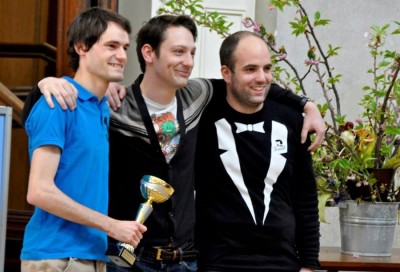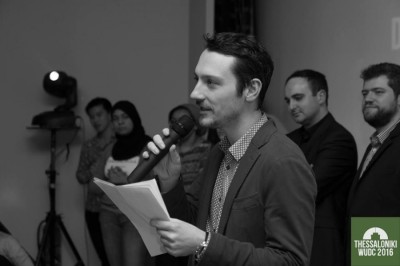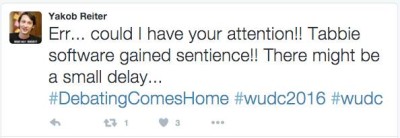„I took the first step“: Interview with Worlds Tab Master Jakob Reiter
Worlds are over, but some questions remain. Why was there a delay during the preliminary rounds every day? Did Tabbie2 malfunction at any time? Or were the adjudicator scores lost? Worlds Tab Master Jakob Reiter from DK Wien talked to Achte Minute about tabbing the biggest international tournament, his software Tabbie2, and other technical details.
Achte Minute: Dear Jakob, you were one of the Tab Masters at the World University Debating Championships in Thessaloniki. How do you feel after this tournament?
Jakob: I am really happy I had the opportunity to be the Tab Master. It is always a great challenge to tab a tournament of that size. I mean, it’s the biggest debate competition in British Parliamentary Style. You never know what will happen during the tournament.
AM: You only joined the team in November. How did that happen?
Jakob: Manos Moschopoulos and Chris Bisset called and told me that the original Tab Master had to resign for personal reasons. They asked if I would fill in that spot on a very short notice, and I said: ‚Well, it’s difficult, but I’ll try‘ (laughs). I believe they asked me because I – as the lead developer – had the best knowledge of the Tabbie2 platform. The second Tab
Master Chuan-Zhen, or CZ for short, had done the core algorithms for allocating the adjudicators with his program Adjumo. I was responsible for the entire user and venue management via Tabbie2. This was the closest we could get to a good system in two months.
AM: So Adjumo is a second program that was used on the tournament. Why were there two different programs?
Jakob: When we had an initial look at the Tabbie2 algorithm like it was used in Vienna, it was obvious that it does not automatically take regional representation into account. The program currently allocates adjudicators based on clashes and other criteria, and then gives the user just an interface where he or she can color-code the regional representation. But the Chief Adjudicators had promised in their bid to take regional representation into account when allocating adjudicators. They wanted language and regional diversity to be included as criteria in the algorithm. Tabbie2 did not support that back then.
Neither CZ nor I felt confident to integrate these new criteria into Tabbie2’s algorithm in just two months. So CZ took up the challenge to write a new program. I think for the time that he had, he did a marvelous job.
AM: During the preliminary rounds there often was a delay of several hours. Some people speculated that WiFi broke down or that Tabbie2 itself was broken.
Jakob: The problem really was that we were too slow, but that was an overall problem. The software worked perfectly fine; from my point of view, Tabbie2 was functioning really well. There obviously were some small bugs along the way – that happens when you use rather new software. But we could successfully fix them on the spot. I heard rumors that at some point we had lost all the adjudicator scores or the entire tab or so. That never happened! In the end everything worked. We were just a little slow.
AM: Tabbie2 runs in a cloud and needs a stabile WiFi connection. On the American Farm School Campus the WiFi connection was rather weak and the same was true at the finals. Did the organizers know about this issue, and if so, why did they choose Tabbie2?
Jakob: I told them rather early in the process that in order to set up Tabbie2 correctly, you needed to have a stable WiFi connection. They went out of their way to achieve that. For example, George Stefanidis did an amazing job providing WiFi and blocking all other traffic. So we just had a dedicated WiFi that only worked with Tabbie2. It was stable most of the time. At the end, we collected the vast majority of ballots and feedback via the e-system and there was no problem at all.
For future tournaments, this will be something to keep in mind. Obviously, low WiFi connectivity is something some institutions will have difficulties with. But as information technology becomes more common, I think it will become less of a problem.
AM: At how many tournaments has Tabbie2 been used so far?
Jakob: According to the unique ID’s in the database, Thessaloniki Worlds was the 160th tournament. But it was already quite a success at big tournaments such as Cambridge, Oxford, and Vienna EUDC. So I was confident running it at Worlds.
AM: The opinions about Tabbie2 differ a lot. While some say that ‚it’s a wonderful program‘ or ‚the best we have right now for tabbing‘, others report that there are ’still too many teething problems‘ and ‚it’s too inflexible‘. What do you think about your program after this big tournament?
Jakob: I believe it is a really fine software fitting a specific style of tabbing a tournament. Some of the processes may be unusual from what we used to have with other tabbing softwares. It is a question of whether you prefer Tabbie2 Tabbycat, Tournaman, or Tabbie1. That really depends on your preferences on the features that you want.

Winners of the Austrian Championships 2014: Mark Etzel, Jakob Reiter, Christoph Jäger (l.t.r.) (c) AFA DC Wien
AM: What advice do you have for future tournament hosts and Tab Masters who want to use Tabbie2?
Jakob: I would recommend that they get familiar with the software. Run at least a small tournament or a weekend test tournament with some actual data. Have a look at how the software behaves, at how the features work. Especially pre-setting the panels can really speed up the process later on.
AM: Can you give an example for that?
Jakob: Normally, you draw a round and then you re-allocate the adjudicators based on where you want them to be in the tab. But with the “pre-set panels”-feature you can already set the panels for the rounds in advance, preferably during the previous round. When you generate the round, the pre-set panels are basically placed in the draw or wherever they best fit into. This gives you a massive speed boost when setting the rounds.
Christine Simpson and Michael Shapira at the Vienna Euros did a marvelous job at setting certain combinations of panels during the round. And then when we drew the round, we basically just filled up the panels with the remaining un-allocated adjudicators and then the round was good to go. And that’s why we achieved such a massive speed bonus.
AM: What does Tabbie2 mean to you?
Jakob: With Tabbie2, I took the first step. I now invite the whole community to continue working with it, using it for tabbing or improving the code. If there are programmers who want to get involved in the project, I am more than happy to open the source code to them and help the community to create a better software and a better tabbing experience.
AM: There were people who started a fake twitter account ‚Yakob Reiter‘ and tweeted things like: ‚Oh man… I just woke up… is the tab ok?‘.
Jakob: Yes, I heard about that (laughs). Actually, I consider that an honor. Apparently, I was doing something that caused people wanting to mark me on a certain base. I appreciate the effort and I do not take that too seriously. And some of the jokes are actually super funny.
AM: What conclusion do you draw after this experience?
Jakob: Tabbing for the Worlds is a very demanding job. When you are faced with certain decisions by the Worlds Council, it seems like some people do not appreciate your work. My experience was that the participants were really happy with the software. And even though there were some delays, in general they appreciated the work I did. With the Council, I’m not really sure. The politics in Council sometimes baffel me, because it is quite a political institution by now. There are parts of the process I personally do not want to get involved in because they seem really complicated. But overall I am really happy.
AM: Thank you very much for your time, Jakob.
The questions were asked by Saskia Höfer.
hoe/hug
Jakob Reiter was the president of Debattierklub Wien from 2011 to 2013. He won the Austrian championships in 2014 and South German championships in 2013. He tabbed the EUDC Vienna in 2015 and WUDC Thessaloniki 2016 and is the lead developer behind the tabbing software Tabbie2.
Das Mittwochs-Feature: Jeden Mittwoch ab 10.00 Uhr stellt das Mittwochs-Feature eine Idee, Debatte, Buch oder Person in den Mittelpunkt. Wenn du selbst eine Debatte anstoßen möchtest, melde dich mit deinem Themen-Vorschlag per Mail an team [at] achteminute [dot] de







